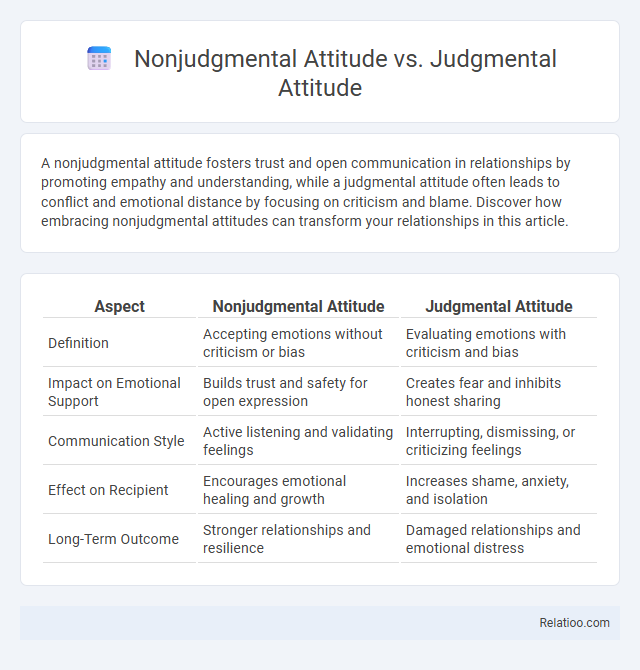A nonjudgmental attitude fosters trust and open communication in relationships by promoting empathy and understanding, while a judgmental attitude often leads to conflict and emotional distance by focusing on criticism and blame. Discover how embracing nonjudgmental attitudes can transform your relationships in this article.
Table of Comparison
| Aspect | Nonjudgmental Attitude | Judgmental Attitude |
|---|---|---|
| Definition | Accepting emotions without criticism or bias | Evaluating emotions with criticism and bias |
| Impact on Emotional Support | Builds trust and safety for open expression | Creates fear and inhibits honest sharing |
| Communication Style | Active listening and validating feelings | Interrupting, dismissing, or criticizing feelings |
| Effect on Recipient | Encourages emotional healing and growth | Increases shame, anxiety, and isolation |
| Long-Term Outcome | Stronger relationships and resilience | Damaged relationships and emotional distress |
Understanding Judgmental and Nonjudgmental Attitudes
Understanding judgmental and nonjudgmental attitudes involves recognizing how perceptions affect interactions and personal growth. A judgmental attitude often leads to assumptions and negative evaluations, limiting open communication and empathy. Your ability to adopt a nonjudgmental or receptive attitude fosters acceptance, promotes understanding, and supports healthier relationships by embracing diverse perspectives without criticism.
Key Differences Between Judgmental and Nonjudgmental Mindsets
The key differences between judgmental and nonjudgmental mindsets revolve around perception and response to others' behaviors or ideas. A judgmental attitude involves evaluating and categorizing actions or beliefs as right or wrong, often leading to criticism or bias, whereas a nonjudgmental attitude embraces openness, acceptance, and understanding without immediate evaluation. Your ability to cultivate a receptive attitude promotes empathy and deeper communication by allowing ideas and feelings to be received without prejudice, distinguishing it from both judgmental and strictly nonjudgmental stances.
Psychological Roots of Judgmental Attitudes
Judgmental attitudes often stem from deep psychological roots such as insecurity, fear of the unknown, and a need for control, which contrast sharply with the openness found in receptive attitudes that encourage empathy and understanding. A nonjudgmental attitude promotes emotional resilience by reducing defensiveness and allowing you to engage with others without bias or preconceived notions. Embracing receptivity enhances personal growth and fosters healthier relationships by recognizing the complexity of human behavior beyond simplistic judgments.
Benefits of Adopting a Nonjudgmental Attitude
Adopting a nonjudgmental attitude fosters open communication and empathy by minimizing bias and allowing individuals to express themselves freely without fear of criticism. This approach enhances emotional well-being and strengthens interpersonal relationships by promoting understanding and acceptance. In contrast to judgmental attitudes, which breed conflict and defensiveness, and receptive attitudes that focus on openness, nonjudgmental attitudes create a safe psychological environment conducive to learning and personal growth.
Negative Impacts of Judgmental Thinking
Judgmental thinking often leads to increased stress, damaged relationships, and decreased emotional well-being by fostering negativity and intolerance. Your ability to connect with others and understand different perspectives diminishes, resulting in missed opportunities for growth and collaboration. Embracing a nonjudgmental and receptive attitude promotes empathy, open communication, and a healthier mindset.
How a Nonjudgmental Perspective Enhances Relationships
A nonjudgmental attitude fosters open communication by allowing individuals to express themselves without fear of criticism, thereby strengthening trust within relationships. This perspective contrasts with judgmental attitudes, which often create barriers and misunderstandings through negative evaluations. Embracing a receptive attitude promotes empathy and active listening, further enhancing emotional connection and mutual respect.
Overcoming the Habit of Being Judgmental
Overcoming the habit of being judgmental requires cultivating a receptive attitude that embraces openness and curiosity instead of immediate evaluation. A nonjudgmental attitude promotes empathy and understanding by suspending preconceived notions and fostering acceptance of diverse perspectives. Emphasizing mindful awareness and reflective practices helps rewire cognitive patterns, shifting from judgmental reactions to adaptable, compassionate responses.
Practicing Nonjudgmental Awareness in Daily Life
Practicing nonjudgmental awareness in daily life involves observing thoughts and emotions without labeling them as good or bad, which enhances emotional resilience and mental clarity. A nonjudgmental attitude fosters openness and empathy, contrasting sharply with a judgmental attitude that can create barriers and reinforce biases. Cultivating a receptive attitude encourages mindfulness and acceptance, allowing individuals to engage fully with experiences and improve interpersonal relationships.
Nonjudgmental Attitude in Mental Health and Therapy
A nonjudgmental attitude in mental health and therapy fosters a safe, supportive environment where Your thoughts and feelings are accepted without criticism, enabling deeper self-exploration and healing. Unlike judgmental attitudes that can evoke shame or defensiveness, a nonjudgmental stance encourages trust and openness between therapist and client, promoting effective communication and therapeutic progress. Receptive attitude complements nonjudgment by remaining open to new perspectives and experiences, enhancing emotional resilience and personal growth.
Tips to Cultivate a Nonjudgmental Mindset
Cultivating a nonjudgmental attitude involves practicing mindfulness by observing thoughts and feelings without labeling them as good or bad, which helps reduce bias and emotional reactivity. Embracing empathy allows individuals to understand others' perspectives without immediate evaluation, promoting open communication and deeper connections. Regular self-reflection and intentional pauses before responding foster a receptive attitude that balances awareness with compassion, enhancing emotional intelligence and interpersonal relationships.

Infographic: Nonjudgmental Attitude vs Judgmental Attitude
 relatioo.com
relatioo.com